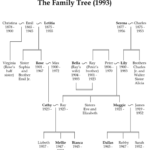Family names play a crucial role in genealogy research, acting as a gateway to understanding one’s ancestry and connecting with the past. Surnames, often passed down through generations, hold important clues about an individual’s heritage, cultural background, and even geographical origins. Tracing family names can provide vital insights into the history and legacy of your ancestors, and can sometimes lead to discoveries that otherwise might remain hidden. Let’s explore the role of family names in genealogy research and why they are so important for uncovering your family’s history.
1. Providing a Framework for Research
Family names are often the starting point for genealogical research. When researching a family tree, the surname provides a framework to trace the lineage through various generations. Surnames allow researchers to connect individuals from different time periods, locations, and social classes. By identifying common family names, researchers can map out relationships, track migration patterns, and even find lost branches of the family tree. For example, if a family name is unique to a particular region, it can narrow down where to focus further research, helping to pinpoint vital records and historical documents.
2. Revealing Geographical Origins
Family names are frequently tied to specific locations, providing clues about an ancestor’s place of origin. Many surnames have geographic roots, such as town names, landmarks, or even the name of a country. For instance, the surname “London” might indicate that an ancestor originated from the capital city of England, while “Hill” could point to an ancestor who lived near a hill or elevated area. In some cases, surnames were taken from the names of villages or regions, making them essential for genealogists looking to trace the movement of their ancestors across regions or countries.
3. Reflecting Occupations and Social Status
Many family names have their roots in historical occupations, trades, or roles within society. Surnames like “Smith,” “Taylor,” and “Baker” are indicative of the professions held by an ancestor, while names like “King” or “Lord” might hint at noble or royal origins. Understanding the occupation or social standing linked to a surname can help paint a clearer picture of the family’s history. For example, a “Cooper” likely refers to someone who made barrels, while a “Fletcher” could have been an arrow maker. Knowing these details can guide genealogical research and offer clues about an ancestor’s lifestyle and economic circumstances.
4. Tracing Family Migration Patterns
Family names also play an essential role in tracing migration patterns. Over the centuries, families have relocated for a variety of reasons—whether due to war, economic opportunities, or political changes. By examining a surname’s occurrence in different geographical locations, genealogists can track family migrations and identify where ancestors may have lived in the past. For instance, the surname “O’Connor” is predominantly found in Ireland, but it can also be found in countries like the United States, Canada, and Australia, where Irish immigrants settled in large numbers. By tracing the movement of these names, genealogists can better understand the story of their ancestors’ journeys.

5. Connecting with Extended Family Members
Family names are also instrumental in connecting with distant relatives. When researching family trees, surnames can lead to the discovery of distant cousins, especially when family members have kept their names intact across generations. Genealogical websites, census records, and birth or marriage certificates often provide valuable information about individuals who share the same surname. These connections can be especially important when researching families with common names, as they can help identify multiple branches of the same family tree. DNA testing also plays a role here, as individuals with the same surname might share common genetic markers, revealing distant family ties.
6. Understanding Cultural and Ethnic Heritage
Surnames are deeply rooted in cultural and ethnic traditions. A surname can reveal the ethnic background of your ancestors, as many surnames are specific to particular cultural or linguistic groups. For example, surnames such as “Nguyen” or “Tran” are common among people of Vietnamese descent, while “Garcia” and “Rodriguez” are often associated with Spanish-speaking populations. By studying the origins of family names, genealogists can gain insights into the broader cultural and social context in which their ancestors lived. This understanding can deepen one’s connection to their heritage and foster a greater appreciation for family traditions.
7. Unlocking Hidden Stories in Family History
Sometimes, family names contain hidden stories that have been passed down through generations. Surnames can provide insights into personal or familial events—whether it be a name change due to an immigration process or the use of a surname to commemorate a significant historical event. For instance, a surname that includes “von” might indicate noble lineage, or a name that translates to “son of” could offer clues about the family’s patriarchal structure. Researching these names can unlock fascinating personal narratives and add layers of meaning to family history.
Conclusion
Family names serve as essential building blocks in genealogy research, providing valuable insights into one’s ancestors and their journeys through time. By tracing family names, genealogists can learn about the geographical origins, occupations, social roles, and even the migration patterns of their forebears. These names help create a roadmap for uncovering hidden histories, connecting distant relatives, and fostering a deeper understanding of cultural heritage. Whether through printed records, online databases, or DNA testing, family names are indispensable tools for anyone seeking to explore their family’s roots.











